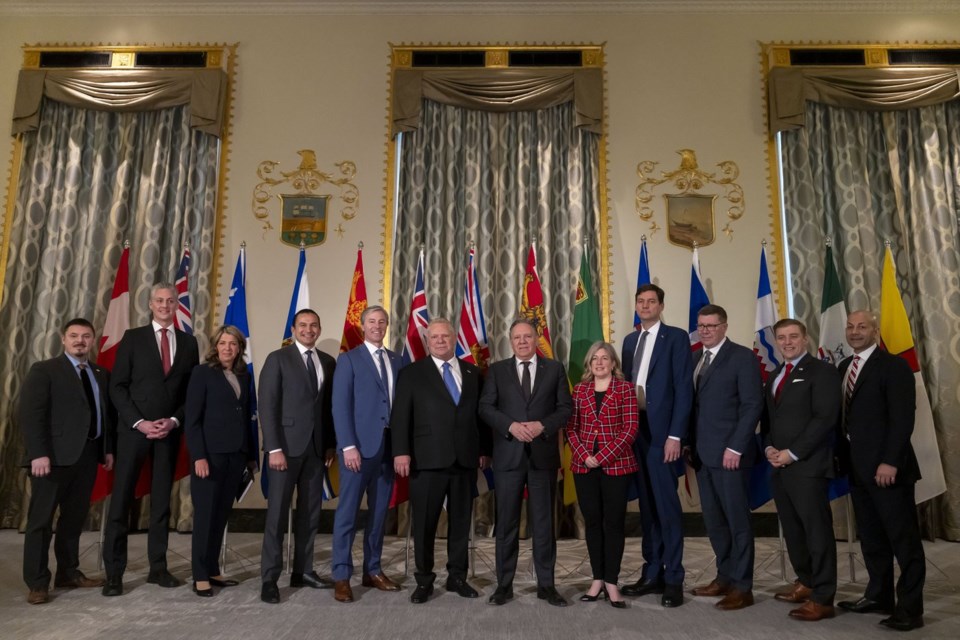WASHINGTON — Territorial premiers said it is a critical time for the Arctic amid U.S. President Donald Trump's increasing rhetoric of American expansion and actions to disrupt global trade.
But they are very clear: the Arctic is not for sale.
"The people of the north are the ones asserting Canada's sovereignty," said Northwest Territories Premier R.J. Simpson in Washington Thursday.
Simpson, along with Yukon Premier Ranj Paillai and Nunavut Premier P.K. Akeeagok, were scheduled to meet with representatives from Greenland, which Trump has also made noise about trying to acquire.
The president complained about Canada later Thursday as he signed an order to implement "reciprocal tariffs" — raising U.S. duties to match the tax rates that other countries charge on imports — his latest move disrupting the global economy. The duties could come into force as early as April.
Speaking to reporters in the Oval Office, Trump's ire became focused on America's northern neighbour. He repeated claims that Canada should become the 51st state, griped about defence spending and northern security and called Prime Minister Justin Trudeau a governor.
"Take a look at what's going on out there — you have Russian ships, you have China ships, you have Chinese ships, you have a lot of ships out there," Trump said. "You know people are in danger. This is a different world today."
Trump's comments bring little relief to Canada's 13 premiers who were all in the United States capital Wednesday for the first time in history — part of a full-court press against Trump's threats to impose steep tariffs on Canadian goods.
Premiers had a meeting with two top White House advisers who promised to carry their message to the Oval Office. James Blair, White House deputy chief of staff, said later Wednesday that they "never agreed that Canada would not be the 51st state."
Territorial leaders were undeterred, bringing a message of opportunities for Arctic collaboration between Canada and the United States to a talk at the Wilson Center Thursday morning.
The three territories have critical minerals essential for U.S. defence and advancement, as well as the geographic position to be a crucial partner in continental safety.
"This is a moment where people are now taking notice and it's providing real opportunities for economic development in the north, but also the social development," Simpson said.
Trump's increasing threats of devastating duties come as the president also expands on ideas around American imperialism, promising to redevelop Gaza, take back the Panama Canal, annex Greenland and make Canada the 51st state.
Trump's Arctic push comes as he has talked about access to critical minerals and the American desire to push against the growing geopolitical presence of China and Russia in the region.
Expansionist discourse is ringing alarm bells in Canada and Europe. Greenland is a semi-autonomous Arctic territory that isn’t part of the European Union but whose 56,000 residents are EU citizens, as part of Denmark — a NATO ally.
Greenland also has cultural, linguistic and family ties to the Inuit in Canada. The territorial premiers were meeting with Kenneth Høegh, a representative of Greenland to the United States, and Stig Piras, with Denmark’s Embassy in Washington.
Trump's ongoing comments about Arctic regions was likely to be a topic of discussion, as is the need to include Indigenous people who live there in any conversation about the Arctic's future, the premiers said.
A dark point in Canada's colonial history was the forced relocation of Inuit to act "as human flagpoles" in Grise Fiord and Resolute Bay in the High Arctic, said Akeeagok.
"When you talk about the true impact in terms of sovereignty, I know it from a personal experience," said Akeeagok, who grew up in Grise Fiord.
Canadian leaders should not get distracted, said Yukon Premier Ranj Pillai.
Pillai met with Donald Trump Jr. in North Carolina in December and has also spoken with Mike Dunleavy, Alaska’s governor, who is close with members of the Trump administration.
"Donald Trump is not going to own the Arctic and he's not going to own Canada,” Pillai said. “But he will own inflation if these tariffs come in ... And that's not something he wants to do because his commitment to Americans was to make life more affordable."
There is opportunity for Canada to sit down with Trump, someone who considers himself a "dealmaker," Pillai said.
The northern territories have potential to play an important role in future North American prosperity and security, the premiers said, but it will take investment in infrastructure. Addressing the issue could also appease one of Trump's main irritants — that Canada is not meeting it’s NATO defence spending target.
Trudeau pledged last year that Canada would hit the NATO target, amounting to two per cent of gross-domestic product on defence, by 2032 — which received criticism from Republican lawmakers and Trump for being far too late.
The territorial premiers made the case that investing in the Arctic, including highways and ports, would count toward NATO spending, while also bringing much-needed infrastructure to their regions.
Canada released a new Arctic foreign policy late last year, which committed to promoting investment in a wide range of sectors — including critical mineral development, transportation and energy — but didn't specifically make funding commitments in those areas.
Ottawa has said the Arctic policy complements the updated defence policy, released last April, which promised $218 million over 20 years to build and operate "support hubs" across the North.
The premiers said there needs to be quick action in the north in the wake of the Trump administration.
“It’s very important that we focus on this now," Pillai said.
— With files from The Associated Press
This report by The Canadian Press was first published Feb. 12, 2025.
Kelly Geraldine Malone, The Canadian Press



